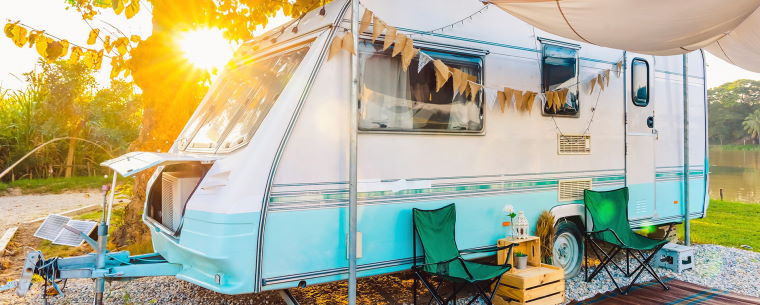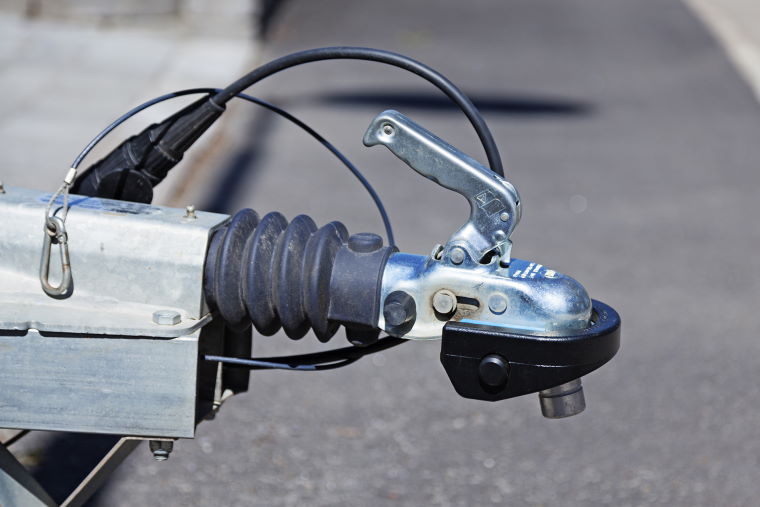Do Caravans Need Brakes?
Bradley Jando | Friday 16th July 2021 3:01pm

If youíre considering buying a caravan or trailer in order to explore during the Summer months then youíre likely wondering what legal considerations you need to account for - one of those is usually whether caravans need brakes.
The short answer is yes - with the exception of caravans and trailers that weigh a total gross weight of less than 750kg. The vast majority of modern caravans and medium-sized trailers weigh significantly more than 750kg, so theyíre legally required to have brakes. When you think about the weight of most modern cars, they tend to be between 1 and 2 tonnes, so having an extra 750kg attached to the car is likely to significantly affect braking when relying on only the carís brakes.
What kind of brakes do caravans have?
Un-braked caravans and trailers are usually attached to the towing vehicle with a rigid hitch Ė so the vehicleís brakes have to compensate for the added weight. This isnít usually too much of a problem if sensible speeds are adhered to. Braked caravans in the UK almost always have whatís known as an Over-Run Braking System.
This is a system that enables a caravan hitch to be used with any towbar and could be described as a passive braking system insofar as itís not directly controlled by the towing vehicleís brakes.
When you think of the huge variety of vehicle and caravan combinations, itís not cost effective to make specific, expensive modifications to all towing vehicles for specifically different caravans. The Over-Run Braking system is one of the simplest ways to have a braking system thatís universally usable across all caravan and trailer hitches Ė without needing particular, brand-specific couplings.
How does an Over-Run Brake work?

The Over-Run brakes work in a similar way to your carís handbrake. Except, instead of you pulling a lever (the handbrake) upwards in order to tension the cable, the cable is tensioned by the hitch itself.
Unlike a rigid hitch for small trailers, an Over-Run Brake hitch features a telescoping end. The ball socket joint is attached to your carís towbar as usual, but the bar sits inside a structure that lets it move in and out. As you brake with your towing vehicle, the trailer or caravan is pressed against your car due to inertia. Because of this, the hitch bar gets pressed through the housing into a lever which tensions the caravan brakes. Your carís brakes and the caravan brakes now work together to slow down until you stop.
As you pull forward from stationary, the hitch bar is pulled back out of the housing, which releases the lever and deactivates the brakes Ė allowing you to drive on with your caravan.
The Breakaway Cable
In case of emergencies, caravan hitches have whatís called a breakaway cable. This is usually a steel cable thatís fastened to the towing vehicleís towbar via a carabiner clip. This clip is attached to the same lever that the hitch bar itself activates. If the hitch detaches from the towbar, the breakaway cable will be tensioned and activate the brakes.
Need your brakes looked at?
If you need the brakes of your caravan or towing vehicle inspected, get in touch with your local Kwik Fit centre.
Any facts, figures and prices shown in our blog articles are correct at time of publication.
Featured Articles
Is it Illegal to Drive With One Headlight?
Saturday 19th July 2025
Wondering if itís illegal to drive with one headlight? Learn about the safety risks and penalties of illegal blown bulbs and why you should fix them promptly.
Air Con in EVs & Hybrids: Experts Answer Your Questions
Monday 30th June 2025
Does air con drain EV batteries? Can you use the air con while charging an electric car? Find out the answers to these questions & more from Kwik Fitís experts.
Why Is Your Car Making a Noise? Fixes & Tips
Friday 13th June 2025
When your car starts making unexpected noises, it can certainly be quite disconcerting; it may be nothing to worry about, but hereís what you need to know.









